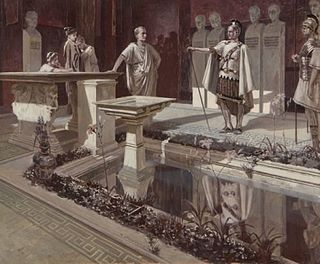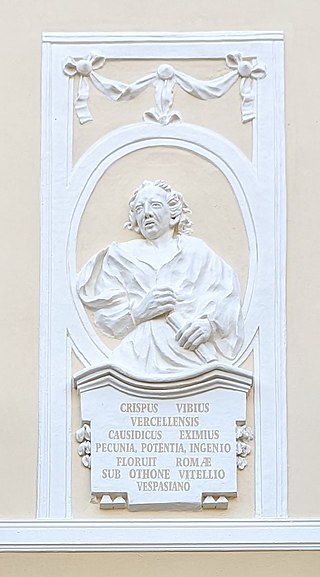Later career
Aponianus is believed to have served as a suffect consul some time around 71 or 73. His name appears as consul in the primary sources, but none provide the exact year. [9] Paul Gillivan suggests the possible dates for his tenure as suffect consul could be November/December 71, the last half of 72, or March/April of 73. [10] However, more recently Giuseppi Camodeca has completed the list of consuls for 71, so the available dates for his tenure are now limited to 72 and 73. [11]
There is epigraphical evidence that, as a member of the curator riparum et alvei Tiberis, he was responsible for repairs made on the right bank of the Tiber River in 73. [12]

Aulus Plautius was a Roman politician and general of the mid-1st century. He began the Roman conquest of Britain in 43, and became the first governor of the new province, serving from 43 to 46.
Aulus Platorius Nepos was a Roman senator who held a number of appointments in the imperial service, including the governorship of Britain. He was suffect consul succeeding the consul posterior Publius Dasumius Rusticus as the colleague of the emperor Hadrian for March to April 119 AD.
Marcus Roscius Coelius was a Roman military officer of the 1st century AD. He was appointed suffect consul for the nundinium March-April AD 81 with Gaius Julius Juvenalis as his colleague.
Lucius Vitellius was a Roman senator who lived in the 1st century. He was the second son of Lucius Vitellius and Sextilia, and younger brother of emperor Aulus Vitellius. Lucius was suffect consul in the nundinium of July-December 48 with Gaius Vipstanus Messalla Gallus as his colleague.
Titus Flavius T. f. T. n. Sabinus was a Roman politician and soldier. A native of Reate, he was the elder son of Titus Flavius Sabinus and Vespasia Polla, and brother of the Emperor Vespasian.
Marcus Hordeonius Flaccus was a Roman senator who lived during the first century. He was suffect consul for the nundinium of March to April 47 as the colleague of Gaius Calpetanus Rantius Sedatus, and later commander of the Rhine army during the Batavian rebellion.

Gaius Julius Quadratus Bassus (70–117) was a Roman senator and general. He rose from provincial aristocratic origins to occupy the highest offices of Rome. He served as a legionary commander and as imperial governor of Judea, Cappadocia, Galatia, Syria and Dacia. He is known to have been active under Trajan in the Dacian and Parthian Wars. Bassus was suffect consul in the nundinium of May to August 105 with Gnaeus Afranius Dexter as his colleague.
The gens Vitellia was a family of ancient Rome, which rose from obscurity in imperial times, and briefly held the Empire itself in AD 69. The first of this gens to obtain the consulship was Aulus Vitellius, uncle of the emperor Vitellius, in AD 32.

Lucius Junius Quintus Vibius Crispus was a Roman senator and amicus or companion of the Emperors, known for his wit. He was a three-time suffect consul.

Gaius Caristanius Fronto was a Roman soldier and equites whom Vespasian promoted to the Roman Senate for his loyalty to the latter in the Year of Four Emperors. He was appointed suffect consul in AD 90 as the colleague of Quintus Accaeus Rufus.
Marcus Aponius Saturninus was a Senator of Imperial Rome, active in the latter half of the first century AD. His parents, also of senatorial rank, were wealthy and owned property in Egypt. He appears in the Acta Arvalia in the year 57 AD; classicist Ronald Syme suggests that he was made a member of the Arval Brethren due to the influence of Annaeus Seneca. Saturninus is mentioned as being present in 66 for sacrifices on the Capitol with the emperor Nero. Tacitus calls him a consul, but the date of his office is uncertain. He may have been consul in 55; Classical scholar Paul Gallivan at the University of Tasmania has argued that Saturninus was suffect consul between 63 and 66, by which time he was recorded as becoming promagister.
Lucius Tettius Julianus was a Roman general who held a number of imperial appointments during the Flavian dynasty. He was suffect consul for the nundinium of May–June 83 with Terentius Strabo Erucius Homullus as his colleague.

Lucius Funisulanus Vettonianus was a Roman general and senator during the reigns of the Flavian emperors. He was suffect consul in the nundinium of September to October 78 with Quintus Corellius Rufus as his colleague.

Lucius Caesennius Sospes was a Roman senator of the 1st and 2nd centuries AD. Through his mother, Flavia Sabina, a cousin of the Roman emperors Titus and Domitian, his connections enabled him to hold a series of civil and military imperial appointments. He was suffect consul in the nundinium of May to August 114 as the colleague of Gaius Clodius Nummus. Sopses is known primarily from an inscription found in Pisidian Antioch.
Gaius Manlius Valens was a Roman senator of the late first century AD. He was selected as consul ordinarius in his ninetieth year, serving with Gaius Antistius Vetus in AD 96.
Gaius Calpetanus Rantius Quirinalis Valerius Festus was a Roman senator, general, and amicus to each of the Flavian emperors. He proved his value to the Flavians when, as legatus legionis, or commander, of Legio III Augusta stationed in Africa, he assassinated the proconsul, who favored a rival of Vespasian during the Year of Four Emperors. He maintained his loyalty through the reigns of his sons Titus and Domitian, but fell out of favor during the latter's reign and was forced to commit suicide.
Lucius Neratius Priscus was a Roman Senator and leading jurist, serving for a time as the head of the Proculeian school. He was suffect consul in the nundinium of May–June 97 as the colleague of Marcus Annius Verus.
Appius Annius Gallus was a Roman senator and general who flourished during the first century. He held the office of suffect consul in 67 with Lucius Verulanus Severus as his colleague. The suffect consul of 67 is commonly identified as the general who supported Otho during the Year of the Four Emperors.
Lucius Nonius Calpurnius Torquatus Asprenas was a Roman senator of the early Roman Empire, who flourished under the reigns of Nero and Vespasian. He was suffect consul around the year 78.
Gaius Julius Proculus was a Roman senator, who held a number of imperial appointments during the reign of Trajan. He was suffect consul in the nundinium of May to August 109 as the colleague of Gaius Aburnius Valens. He is known entirely from inscriptions. Anthony Birley notes there is a plausible possibility that Proculus also held a second suffect consulate; any man recorded as holding a second consulate after AD 103, held it as an ordinary consul, not as a suffect consul.
![]() This article incorporates text from a publication now in the public domain : Smith, William (1870). "Aponianus,Dillius". In Smith, William (ed.). Dictionary of Greek and Roman Biography and Mythology . Vol. 1. p. 247.
This article incorporates text from a publication now in the public domain : Smith, William (1870). "Aponianus,Dillius". In Smith, William (ed.). Dictionary of Greek and Roman Biography and Mythology . Vol. 1. p. 247.




